高中英语必修1 时态语态 (ppt)
高中英语动词的时态和语态
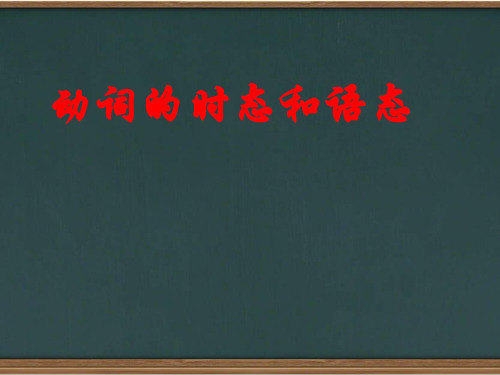
表示将来的某个时间正在进行的动作: At this time tomorrow, I shall be sitting at the table.
(八)现在完成时 have/has done
<1>.现在完成时表示一个动作发生在过去,一直持续 到现在,而且还可能再继续下去。强调对现在造成的影响。 句子中常有already, ever, yet, just, recently, since, so far… E.g. ---The window is so dirty.
<3>. be to do:表示按计划要发生的事或表示可能性, 必要,责任,义务,禁止等。
1. We are to put up a new school in this area. 2. A meeting is to be held this evening. <4>. be about to do:表示马上就要发生的事。
动词的时态和语态
1. 一般现在时 2. 一般过去时 3. 一般将来时 4. 过去将来时 5. 现在进行时 6. 过去进行时 7. 将来进行时 8. 现在完成时 9. 过去完成时 10. 将来完成时 11. 现在完成进行时
(一)一般现在时
〈1〉表示经常性,习惯性的动作或状态。常与一般现在 时连用的时间状语有: always, usually, often, sometimes, seldom, every day, from time to time, etc. E.g. 1. I am your English teacher.
---I know. It hasn’t been cleaned for weeks.
2021届高考英语一轮复习-英语语法专题复习:时态和语态课件(共45张)
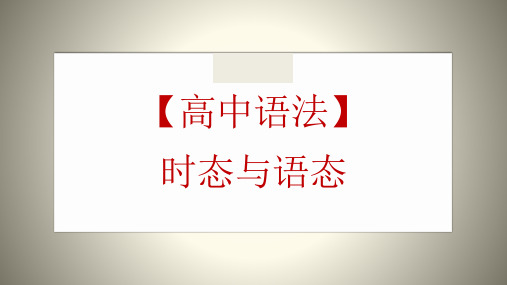
【解析】ቤተ መጻሕፍቲ ባይዱ查动词的语态。and前后连接相同格式的句子成分。后 半句的主语是代词they,谓语动词是give,根据句意应是“他们 被提供机会决定是否要参与研究”,故使用被动语态。
语态
• 主动语态改为被动语态的方法
Many people speak English. English is spoken by many people.
now
future
• 过去某个时间之前一直进行的动作 I had been looking for it for days before I found it. At that point, he realized what he had been doing all along.
完成进行时态
past
A. Has worked
B. worked
C. works
D. had worked
【解析】句意为“史密斯先生曾经在我们学校做了20年老师,他 现在是市长”。
一般过去时
一般过去时用法: ① 表肯定:主语+动词过去式+其他
He went shopping yesterday. ② 表否定:主语+did not (didn't)+动词原形+其他
真题解析
Potential subjects should be informed of the research and
D an opportunity to decide if they want to participate.
A. gave
B. giving
C. give
D. be given
now
future
高中英语语法时态和语态课件(共69张PPT)
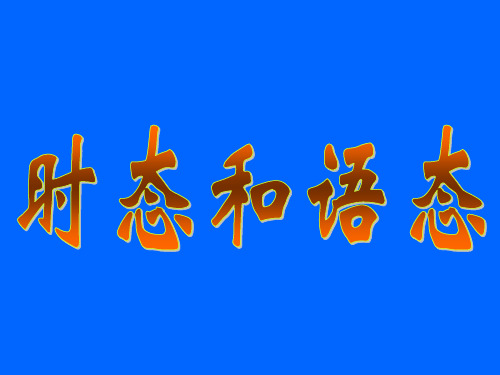
--ann is in hospital.
--yes, i know. i’m going to visit her tomorrow.
--oh,really? i didn’t know. i’ll go and visit her. 2〕表示迹象表明要发生某事,则只能用be going to,e.g.
look at the dark clouds.it’s going to rain. 3〕be going to还有以下用法,e.g. ①强调主观想法或意图: i’m going to wash the car if i have time. (注意:此时
②It was then a small fishing village.
2.特别用法:
1〕表客气或委婉的现在:
①I wondered if you were free this evening.
②I thought you might like some flowers.
(注:过去进行时也可表示现在使语气更委婉、客气,eg.① I was wondering if you could give me a lift. ②We were hoping you would stay with us.能这样用的动 词主要限于want, wonder , think, hope, intend等少数 动词。)
②Someone has broken the window.(结果: 窗户仍破 着)
2〕持续性用法:该用法表示一个过去发生的动作在过去 并未在过去完成,而是持续到现在,且可能继续持续下去 或可能到此结束,e.g.
高考英语一轮复习英语语法专题复习:时态和语态课件
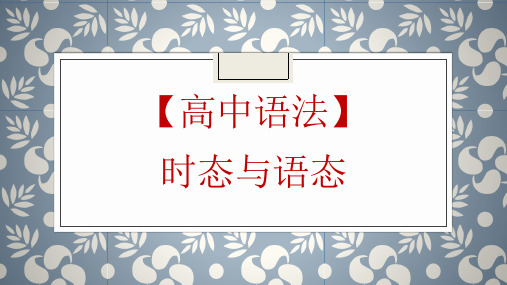
语法知识
英语语法框架
音素★
语音 词法
音节 五种语音现象★ 九大词类 动词★ 词汇搭配 八种句子成分
时态 两大语态 三类非谓语动词
四类句子
句法
五种简单句
并列句
名词性从句
复合句★ 定语从句
特殊句式★ 状语从句
主谓一致
CONTENTS
时态与语态
• 一般时态 • 进行时态 • 完成时态 • 完成进行时态 • 主动语态 • 被动语态
now
future
将来完成进行时 will/shall have been doing
• 动作在某种情况下一直持续到将来某个时间仍未结束。 By the end of this year he will have been acting for thirty years.
将来进行时态
用法: ① 将来某个时间正在进行的动作,或会延续到将来的动作
What will you be ① 常和时间状语then, at that time/moment等连用。
语态是通过动词的变化表现出来的。
doing
at
this
time
next
Monday.
表示将来某个时间要发生的动作或存在的状态。
B. takes
C. is taking
D. has taken
B off at
【解析】考查时态。飞机、火车等按时刻表运行,表达时用一般现 在时表示将来。
一般过去时
(1) 表示过去某个时间发生的动作。 He proposed to Sarah on their annivesary.
(2) 过去某段时间的状态。 I loved him.
英语十六种时态ppt课件

6
2.一般过去时的肯定、疑问、否定三种形式
肯定式
疑问式
否定式
I worked.
Did I work?
I did not work.
He (She, It)worked. Did he (she, it) work? He (She, It) did not work.
13
范围扩展
1. 用过去进行时表示现在主要是为了使语气委婉、客气。 I was wondering if you can give me a lift. 我不知你能否让我搭一下车。 (一般过去时也有类似用法,但比较而言,用过去进
行时显得更客气,更加不肯定。)
2.动词be的过去进行时也可表示过去一时的表现或暂时的 状态。
现在进行时表示说话时正在进行的动作或表示目前一段时 间内正在进行的活动,与现在进行时连用的时间状语有now, these days等。
—What is your mother doing now? 你的妈妈正在干什么? —She is cooking for us. 她正在为我们做饭。 2.现在进行时的具体用法
10
用法
例句
(1) 说话瞬间正在发生的动作,常见的时间 They are watching TV now.
状语有now,at the moment等。如果句首有 他们现在正在看电视。
警示性动词look,listen等,主句的动词也 Listen! The bird is singing in the tree.
(2) be (am, is, are) going to + 动词原形 2.一般将来时的用法
高三英语复习:时态语态课件(共10张PPT)

将来进行时 will/shall be doing will/shall be being done
现在完成时
过去完成时 现在完成进行
时
have/has done had done
have/has been done had been done
have/has been doing
• 不同时态变被动的规律总结:
(2)结尾是s, x, sh, ch, o,前为辅音字母,结尾加es :
• watch— ___________ teach—___________
• go— ___________
do— __________
• wash— ___________
cross— ___________
• mix— __________
at a young age, during the trip, on my previous visits, on April 4, 2016, last night, at the last minute, 表示过 去一段时间内经常发生的或习惯性的动作 第44题 其他根据并列动词时态
固定句式: since 句式 第32,38,40,共3题。 被动语态: 第33,34,35,36,37,41,54,共7题。 不规则动词: 第30,32,33,44,54,共5题
• 保留原来时态中助(will/shall/would/am/is/ are/was/were/has/have/had),把be动词变 为原来时态中do的形式,再加动词的过去分词。
对动词时态语态考察形式的总结:
• 一般现在时:1-14题 • (1)表示现在的状态或经常、反复、习惯性的
动作。 第3题,共1题 (2)表示客观事实或普遍真理。 第1,2,5,6,14,共5题 (3)主将从现 第4,9,10,11,12,13,共5题
高中英语 动词时态和语态

4. 现在进行时 【例】 We are waiting for you now. 我们正在等你。 【例】 He is teaching in a middle school. 他在一所中学教书。 【例】 I'm meeting my father at the station at 5 o'clock. 我五点要去车站接我的父亲。 (1)现在进行时的构成 现在进行时的构成形式为:am/is/are+v.-ing。v.-ing形式的变化规则如下:
ONE If you don't hurry, you will miss the train. 如果你不快点儿,你就会
赶不上火车。 表示事物的固有属性或必然趋势; Fish will die without water. 离开水,鱼就会死。 表示偶然的、临 时的决定。 -Do you know Mr. Smith has come to our town? -No.
Mrs. Peter went to the park to have a walk every day last year. 彼得太太去年每天都到公园去散步。
I went to the cinema once a week when I was at school. 我上学时每周去看一场电影。
ONE ③表示过去连续发生的动作。这种情况下,往往没有表示过去的时间
walk. 她早早起床、提水,打扫房间,然后出去散步。
④在表示时间、条件等的状语从句中代替过去将来时。
They said they would let me know as soon as they got there. 他们说只要他们一到那儿就会马上通知我。
(完整)高中英语语法(时态和语态)

高中英语语法(时态和语态)一.动词的时态时态是谓语动词所表示的动作或情况发生时间的各种形式。
英语动词有16种时态,但是常见的只有九种:一般现在时、一般过去时、一般将来时、现在进行时、过去进行时、现在完成时、过去完成时、过去将来时、现在完成进行时。
(一)一般现在时(do / does)1. 具体用法1)表示经常性或习惯性动作We always care for each other and help each other. 我们总是互相关心互相帮助。
He goes to school every day.2)表示现在的特征或状态He is very happy.Do you si ng? ----A little.3)表示普遍真理Light travels faster than sound. 光速比声速快。
Actions speak louder tha n words. 行动胜过言语。
*常与一般现在时态连用的词或短语主要有:often, usually, sometimes, every day,every morning/afternoon, on Sundays/weekends 等等。
I ofte n go to the cin ema on Sun days. 我经常星期天去看电影。
He goes to work early every day. 他每天上班很早。
(二)一般过去时(did )(1)表示过去某一特定时间所发生的、可完成的动作或状态,常与表示确切过去时间的词、短语或从句连用。
例如:We went to the pictures last ni ght and saw a very in teresti ng film.(2)表示过去习惯性动作。
例如:He always went to class last.I used to do my homework in the library.(三)一般将来时(will / shall do)1)表示将来打算进行或期待发生的动作或状态。
高中英语Lesson 1 时态和语态

I had hoped that I could do the job.
我曾希望我能做好这份工作。
6.一般将来时
一般将来时(Simple Future Tense)
表在将来某个时间会发生的动作或情况。常和tomorrow, next year, in 2018等表示 将来的时间状语连用。 Beijing will host the 47th Olympic Games in 2018.
一般现在时(Simple Present Tense)
考点三
在时间和条件状语从句中,代替一般将来时; 常用的引导词有: 时间: when (...的时候),until(直到...), after(在...之后),before(在...之 前),as soon as(一....) once(一旦/曾经), the moment/the minute(...的时刻/ 分钟), the day...那天); 条件: if(如果), unless(除非), provided(假若). If he accepts the job, he will get more money soon. 如果他肯做那个工作,他很快就能赚到很多钱。
This is the most interesting film I have ever seen.
这是我看过的最有趣的电影。
考点四
在表示“最近几世纪/年/月以来....时间状语中,谓语动词用现在完成时。 in the past few years/months/weeks/days; over the past few years; during the last three months; for the last few centuries, through centuries; throughout history等
高中英语时态语态讲解 PPT
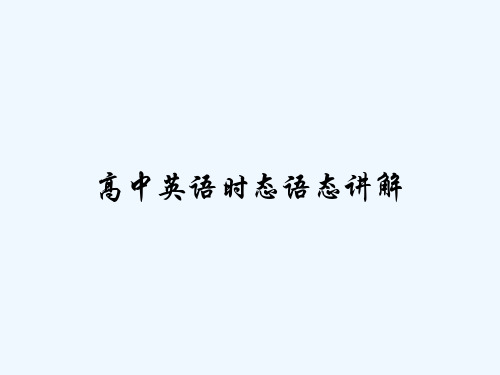
3、 ---Nancy is not ing tonight、
进行体: 它具有暂时性、持续性、未完成性得特点。 现在进行时: 表示此刻或现阶段进行得动作。 过去进行时: 用来表示过去特定得某一时刻正在发生或过 去某一段时间内持续发生得事情。
closes、
3、 进行时将来:表示计划、安排要做得事。如: •I’ve won a holiday for two days to Florida、 I am taking my mum、 •— What were you doing when Tony phoned
you ?
— I had just finished my work and was starting to take a shower、
得不定式被动式有特殊得用法。
• The news is to be found in the evening paper 、
• He is nowhere to be seen、 • You are to be congratulated、 应当向您表示祝
贺。
5、 will/shall will得特殊用法:可以用于表示事先未考虑过, 即说话时临时想到得。 Eg、 ---you’ve left the light on、
1、 All morning as she waited for the
medical report from the doctor, her
nervousness 、
A、has grown
B、is growingC、grwD、had grown
2、 My mind wasn’t on what he was
高中英语语法:谓语动词时态语态课件

7
PPT模板下载:/moban/ 节日PPT模板:/jieri/ PPT背景图片:/beijing/ 优秀PPT下载:/xiazai/ Word教程: /word/ 资料下载:/ziliao/ 范文下载:/fanwen/ 教案下载:/jiaoan/ 字体下载:/ziti/
一般体
一般现在 一般过去 一般将来 过去将来
6
1.一般现在时:do/does
(1)表示习惯性、经常性或现在的状态,常与 always, often, sometimes, usually, frequently, once a week, on Sundays, every day/ week/ month/year等时间状语连用。
行业PPT模板:/hangye/ PPT素材下载:/sucai/ PPT图表下载:/tubiao/ PPT教程: /powerpoint/ Excel教程:/excel/ PPT课件下载:/kejian/ 试卷下载:/shiti/
行业PPT模板:/hangye/ PPT素材下载:/sucai/ PPT图表下载:/tubiao/ PPT教程: /powerpoint/ Excel教程:/excel/ PPT课件下载:/kejian/ 试卷下载:/shiti/
做题步骤
找标志
判语境
分析动作
8
(2020新高考1)Often, only a small part of a museum’s collection ___is____ (be) on display. Most of it is stored aways or used for research.
had been asking
will/shall should/would
高中英语语法:动词的时态与语态

高中英语语法:动词的时态与语态We have meals three times a day.我们一日吃三餐。
(现在的习惯)He is always ready to help others.他总是乐于助人。
(现在的状态)When I was a boy, I often went to play in that park.我小时候常去那个公园玩。
(过去的习惯)1.一般现在时(1)一般现在时的构成一般现在时主要用动词的原形表示,如果主语为第三人称单数,则一般在动词原形后加s或-一般现在时除了可以表示现在的经常性、习惯性动作或存在的状态外,还可表示:①客观真理、科学事实及自然现象。
此用法即使出现在过去语境中,也用一般现在时。
The sun rises in the east.太阳从东方升起。
②用于here, there开头的倒装句中,一般现在时表示现在正在发生的动作或存在的状态。
There goes the bell.铃响了。
Here comes the bus.公共汽车来了。
2.一般过去时(1)一般过去时的构成(2)一般过去时的用法一般过去时除了可以表示过去经常性、习惯性的动作或存在的状态外,还有以下用法:①want, hope, think, intend等动词的一般过去时往往表示“过去原……”之意。
I thought he was an honest man.我原以为他是个老实人。
He didn't intend to hurt you.他本来没打算伤害你。
②wonder的一般过去时有时也可表示现在的行为,但口气要比用一般现在时更加委婉、客气。
I wondered if you could do me a favour.我不知道你能否帮我一个忙。
③used to+动词原形,表示过去的习惯性动作而现在已经不再发生了。
We used to spend our vacation in the mountains.我们以前常常在山里度假。
- 1、下载文档前请自行甄别文档内容的完整性,平台不提供额外的编辑、内容补充、找答案等附加服务。
- 2、"仅部分预览"的文档,不可在线预览部分如存在完整性等问题,可反馈申请退款(可完整预览的文档不适用该条件!)。
- 3、如文档侵犯您的权益,请联系客服反馈,我们会尽快为您处理(人工客服工作时间:9:00-18:30)。
My father was at home the day before yesterday.
一般过去时的结构:
1.表状态
主语﹢was/were + 表语 (adj,adv,n,prep)
2.实义动词表动作 肯定句 I loved you. 否定句:I didn’t love you. 疑问句: Did you love me?
My train leaves at eleven tomorrow morning.
wash 1.The twins ___________(wash) the clothes every day. plays (play) 2.Sometimes he ________ basketball over there. sing 3.How often does ____ Sally ______(sing)?
is going to marry the sailor she____ in Rome last year. 2008年重庆 A. meets B. met C. has met D. would meet
1.Judy
2--Did you watch the basketball match yesterday? -----Yes, I did. You know, my brother ________ in the match. (2008安徽) A.is playing B. was playing C. has played D. had played
He is always studying hard. (表示赞许)
The boy is always talking in class. (表示不满)
3.有时用来表示一个在最近按计划或安排要 进行的动作(这时多有一个表示未来的时间 的状语)主要用于 come, go, leave, arrive, start 等动词.
1.意义: 表示在过去某一时刻或一段时
间正在进行的动作。
2.构成:
was/were +doing
否定式: was/were not +doing Was/Were ……doing? 疑问式: 3.标志词:at this time yesterday at 9:00 last night …was/were doing when…did….
1.Mary ___ a dress when she cut her finger. A. made B. is making C. was making D. makes
2.My brother ___ while he ___ his bicycle and hurt himself. A. fell, was riding B. fell, were riding C. had fallen, rode D. had fallen, was riding
see、hear、smell、taste、feel、notice、agree、 believe、like、hate、want、think、belong, seem等。 如: The food tastes delicious.
B.少数用于表示起止的动词如come、go、 leave、arrive、fly、return、start、open、 begin、close、end、stop等常用一般现在 时代替将来时,表示一个按规定、计划或安 排要发生的动作。
The earth __ around the sun. A. go B. move C. moves He will give you the book as soon as he ___ you. A. will see B. sees C.see
A.表示知觉、态度、感情、某种抽象 的关系或概念的词常用一般现在时:
1
用法 练习
1.经常发生动作或存在 状态,时间标志: often ,sometimes, every day, usually, in the morning , 等 2. 客观真理,客观存在, 科学事实 3.时间、条件状语从句 的从句部分 主将从现
I usually ___ at six in the morning. A. get up B. gets up C. go to bed
1.The twinsare ___________(wash) the washing clothes now. playing (play) 2.Look! He is ________ basketball over there. singing(sing)? 3.Listen! ____ Is Sally _____
现在进行时
1. 构成: am/is/are/ +doing 否定式: am/is/are/ not +doing Am/Is/Are ……doing? 疑问式: 2.标志词: Look! Listen! now,at the moment, right now , at present,或某个具体的时间
1. He always likes playing the piano. 一般现在时
2. We are having an English classes now.
现在进行时 3. They often go home late. 一般现在时 4. Lucy danced the disco at the party last night
过去进行时的使用: 1.表示过去某一时刻或某一段时间内正在 进行的动作(这一过去时间须用时间状 语表示),句中的过去时间状语往往是 then, at that time, this time yesterday, the whole morning yesterday, at 10:00 last Sunday night等。 • e.g They were having a meeting the whole morning yesterday.
• 2.表示一个动作发生时另一过去动作正在进行, 常用于when,while等引导的时间状语从句。 例如:They were still working when I left. 例如:I was writing while he was watching TV. 3.用于语境中。 e.g Shirley ____ a book about China last year but I don't know whether she has finished it. • A. has written B. wrote • C. had written D. was writing
We don’t often play football on the playground. 3.他不在家里做作业。 He doesn't do his homework at home. 4.我们老师们对我们很友好 Our teachers are friendly to us 5每周五下午他去游泳? Does he go swimming on Friday afternoon?
一般过去时
5.They were having a meeting at 10 this morning. 过去进行时
Translate them into English
1.我们每天七点钟上学。 We go to school at seven o'clock everyday.
2.我们没有经常在操场上踢足球 。
动词-ing形式的构成: 一般在动词原形后 go +ing ask write 以不发音的e结尾 的,去e,+ing take 重读闭音节以一个 get 辅音字母结尾的, run 双写这一字母+ing swim
going asking writing taking getting running swimming
3.I don ' t think Jim saw me; he ___ into space. A.just stared B. was just staring C. has just stared D. had just stared 4.I first met Lisa three years ago. She ___ at a radio shop at the time. A.has worked B. was working C. had been working D. had worked
2) He is practising singing these days.
3)They are leaving for school.
He is playing computer games.
He is drinking water (now). They are playing volleyball.
1.表示现在某时或某段时间内正在进行 的动作。
• e.g He is writing a letter now.
2.现在进行时与always, continually, constantly, all the time等副词连用表示反复或习惯性的动作, 含有某种感情色彩, 如赞扬, 遗憾, 讨厌,不满等.
1 我们昨天照了许多照片。
We took lots of photos yesterday.
2 刚才你看见格林先生了吗?
Did you see Mr Green just now?
3. 汤姆两周前没有去广州。
Tom didn’t go to Guangzhou two weeks ago.
4.前天我爸爸在家
Welcome to our class
1.一般现在时 the Present Simple 2.一般过去时 the Past Simple 3.现在进行时 the Present Continuous 4.过去进行时 the Past Continuous
